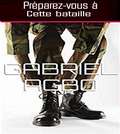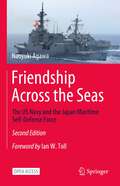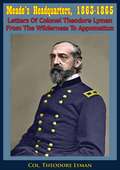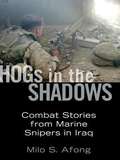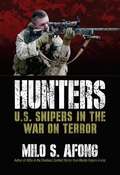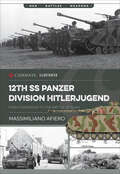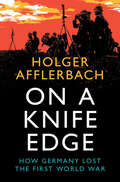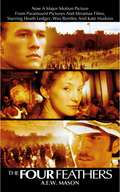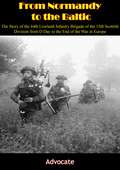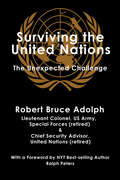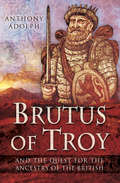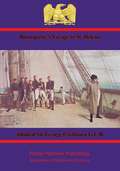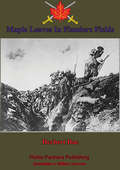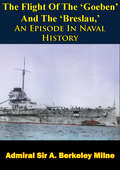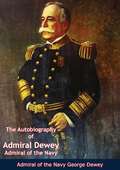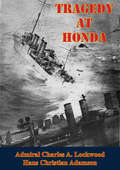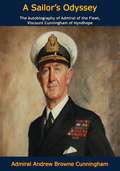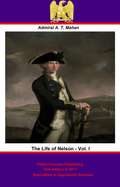- Table View
- List View
Ashfall
by Denise A. AgnewA strong-willed woman and a former Air Force pararescueman have learned to survive in a new world forged by an apocalypse no one could have stopped. Isolated and alone, Mally Andretti finds hope in the tantalizing voice she hears on her ham radio, a man who says he's her friend. But in a world-gone-crazy, danger looms around every corner and it's hard to know who to trust. Denise A. Agnew presents Ashfall, book one in her exciting new series, The Wasteland Trilogy.After surviving an apocalypse, lonely Mally should feel safe. Until a deep, mysterious voice over the ham radio invites her into soul deep conversation and awakens mental and physical cravings.Her voice calls on every fiercely protective instinctive inside Adam, and when she's in danger he'll do anything to protect her.Content Notes: Spicy, Urban Fantasy, Post-Apocalyptic, Suspense, Uniformed Heroes
Before There Was You
by Denise A. AgnewShe's haunted by nightmares of her kidnapping. He's haunted by memories of war. Together they may find the answers to healing their hearts and their minds ... if they can survive the danger stalking them. Denise A. Agnew pens a suspenseful, passionate tale in Before There Was You.Kidnapped in a foreign country, Lana Burns' faith in herself and the world has been shaken to the core. Once home, she finds her world mangled by nightmares and depression. Refusing to give in to fear and torment, she searches for answers. Now she must escape a dark mental place before it swallows her whole.Former Force Recon Marine Aaron MacPherson made it through war without a scratch, but he doesn't count thick scars carved into his mind, threatening to unhinge his happiness forever. His equilibrium teeters on the edge, his battle moving from combat to everyday life. One wrong word from a total stranger sends him on a path to destruction.Both Lana and Aaron have seen hell, and group therapy might show them the way out. Forging a link between them could prove perilous to their hearts. When danger strikes without warning, Aaron and Lana must use their bond to create a way to survive the night.Content Notes: Spicy, Romantic Suspense, Uniformed Heroes, Military, Contemporary
One London Night
by Denise A. AgnewGuilt and anger have kept them apart for years. Now, a love that never died has a chance to burn bright once more. But war-ravaged London brings a new kind of danger, and their rekindled romance is in danger of going up in flames with the city around them. Denise A. Agnew tells a heart-warming tale of hope and courage in her new romance novel, One London Night. br>War Time London, 1940A time when uncertainty festers within even the strongest of men.A time when fear rules everyone's lives.A time when love dares to defy the devastation of war.After years away, American war correspondent Sylvie Hunnicut returns to England determined to put aside tumultuous memories and muster the courage to cover the war in Great Britain. Guilt she harbors over a horrible accident that permanently injured childhood friend Alec Kent threatens to destroy their relationship. Secret longings for him remain in her heart, even if he wants nothing to do with her.Alec Kent's disability works against him in serving his country, until he signs on with the Auxiliary Fire Service. Sylvie's return brings to the forefront Alec's hidden love for her and a determination to prove himself to his disapproving father.But war promises to destroy the possibility of love and bring a great city to its knees.Content Notes: Sweet, Historical Romance WWIIRomance Novel Fiction, Historical Romance Fiction, Historical Fiction, WWII Romance Fiction, 1940's Romance Fiction
The Soldier's Unexpected Family: A Clean Romance (Veterans' Road Ser. #3)
by Tanya AglerHe had a plan…She changed it all!Major Aidan Murphy arrives in the charming small town of Hollydale to take full guardianship of his six-year-old nephew. Only there&’s a slight problem—his vivacious, fiery co-guardian. School teacher Natalie Harrison has no intention of letting Aidan take her best friend&’s heartbroken little boy away. Now Aidan must convince Natalie that blood is stronger than love…even if his heart tells him otherwise.
Préparez-vous à cette bataille
by Gabriel AgboÊtes-vous prêt au combat ? Soyez toujours prêt. Nous ne devons rien tenir pour acquis. Oui, la vie est une guerre, et comme dans toute guerre, il y a toujours de nombreuses batailles à mener. Quand vous en gagnez une, vous vous préparez ou vous passez à la suivante. Jusqu'à ce que vous gagniez la guerre entière. Ici, vous saurez pourquoi la guerre et vous apprendrez aussi les principes de la victoire des batailles de la vie. Salomon est devenu le roi le plus sage, le plus riche, le plus influent et le plus célèbre du monde. Avec ce genre de bonne volonté et de ressources, il est allé de l'avant et a construit une grande armée. Ouah ! Il était donc aussi un stratège militaire ? Oui ! Maintenant, pourquoi ce roi ne peut-il pas profiter de 40 ans de règne pacifique et prospère ? Tenter de l'attaquer, lui ou son royaume, aurait été une mission suicidaire à haut risque pour n'importe qui ou n'importe quelle nation. Quels étaient ses secrets et sa stratégie ? Nous devons toujours être prêts. Notre Dieu est un guerrier et nous devons voir les choses comme Lui les voit. Nous devons nous rapprocher de lui et apprendre comment il mène ses batailles. Nous avons également examiné les politiques de défense de pays comme les États-Unis d'Amérique. Pourquoi est-ce aujourd'hui la seule superpuissance mondiale ? Quelle est l'importance de son budget et de ses activités de défense ? Que fait-elle de bien ? Vous verrez également les chapitres révélateurs suivants : L'Éternel est un guerrier, Préparez-vous à la guerre, Louange, gratitude et humilité, Êtes-vous bien organisé ? Les hommes, le matériel et la stratégie et répartissez-les. Savez-vous que Dieu vous a donné la connaissance comme capital et comme sécurité ? Et comment pouvez-vous le déployer ? Vous devez lire ce livre.
Friendship Across the Seas: The US Navy and the Japan Maritime Self-Defense Force
by Naoyuki AgawaThis Open Access book describes the history of the relationship between the Japan Maritime Self-Defense Force (JMSDF), the heir to the Imperial Japanese Navy (IJN), and the United States Navy (US Navy), with a focus on the individuals who helped build it. Former enemies who fought fiercely on the seas and in the air during the Pacific War, the two navies came to respect each other in action. Soon after the war, when the Cold War turned hot, they began to work together as allies, driven by their respective national interests. With the generous assistance of the US Navy, the JMSDF was established as its counterpart. Over the years, these two navies have gradually built strong ties. Individual officers and sailors on both sides overcame mixed feelings about their erstwhile foes to feel respect for and trust in each other. This was made possible by conducting countless joint exercises and operations at sea. US Navy leaders began to realize that this small maritime force, notwithstanding domestic political, constitutional, and legal limitations, does its job well, is reliable, and can be fully trusted. The JMSDF realized that, sharing common interests and values, there was no better navy in the Asia-Pacific region to ally with. Over seventy years of accumulated shared experiences have transformed this into perhaps the most successful navy-to-navy partnership in the world. The US-Japan maritime alliance today is anchored in this history. Numerous admirals, officers, and sailors of the two navies working together have greatly contributed to the stability and prosperity of the Asia-Pacific region for the past seven decades. This book is intended for readers interested in the history of US-Japan relations and for naval officers and sailors from the US and other countries. It is the author’s sincere desire that they read this book and appreciate the longstanding cooperation between the JMSDF and the US Navy.
Meade’s Headquarters, 1863-1865: Letters Of Colonel Theodore Lyman From The Wilderness To Appomattox [Illustrated Edition]
by George R. Agassiz Col. Theodore LymanIncludes Civil War Map and Illustrations Pack - 224 battle plans, campaign maps and detailed analyses of actions spanning the entire period of hostilities.Originally published in 1922, this book is a collection of letters written by Maj. Gen. George Meade's aide-de-camp, Theodore Lyman, to his wife Mimi.A fascinating first-hand account of the Army of the Potomac from just after Gettysburg to the end of the war. Not only are military battles and life discussed, but the relationships between Grant, Meade, Butler and the other generals are explored in great detail.A great book for anyone interested in American Civil War history.
State of Exception
by Giorgio Agamben Kevin AttellTwo months after the attacks of 9/11, the Bush administration, in the midst of what it perceived to be a state of emergency, authorized the indefinite detention of non citizens suspected of terrorist activities and their subsequent trials by a military commission. Here, distinguished Italian philosopher Giorgio Agamben uses such circumstances to argue that this unusual extension of power, or "state of exception", has historically been an under examined and powerful strategy that has the potential to transform democracies into totalitarian states. The sequel to Agamben's "Homo Sacer: Sovereign Power" and "Bare Life, State of Exception" is the first book to theorize the state of exception in historical and philosophical context. In Agamben's view, the majority of legal scholars and policymakers in Europe as well as the United States have wrongly rejected the necessity of such a theory, claiming instead that the state of exception is a pragmatic question. Agamben argues here that the state of exception, which was meant to be a provisional measure, became in the course of the twentieth century a normal paradigm of government. Writing nothing less than the history of the state of exception in its various national contexts throughout Western Europe and the United States, Agamben uses the work of Carl Schmitt as a foil for his reflections as well as that of Derrida, Benjamin, and Arendt.
Hogs in the Shadows
by Milo S. AfongThere is a special breed of Marine for whom the prey is the enemy--and every day is hunting season. This Marine is a HOG--a Hunter of Gunmen. These are the gripping, gut-wrenching true stories of those Marines in Iraq whose sole purpose on the battlefield is to eliminate the enemy--one combatant at a time. Every time a HOG puts his eye to the glass, it means death for his target. Here, former Scout/Sniper Team leader Milo S. Afong reveals what it takes to be a Hunter of Gunmen. He describes the intensive training that turns expert infantrymen into one-shot life-takers, how they operate in the field--and under fire--and how HOGs get the job done under any conditions. From sniping from a rooftop in Baghdad, to unknowingly being surrounded in a palm grove in the city of Hit, these stories will transport you right into the heat of the desert war, where one squeeze of the trigger can make all the difference.
Hunters
by Milo S. AfongIn the War on Terror, there are no set battles. The fanatical enemy adheres to no warrior code or international law. Their only desire is to kill--or be killed. That's where the snipers of the U.S. Marines, Army, and Navy SEALs come in . . . Here, in their own words, are the compelling true stories of the snipers whose sole purpose is to eliminate the enemy with a single bullet. From Iraq to Afghanistan, this is life and death as seen through the scope of a high-powered rifle. These snipers' stories illustrate the mental discipline and psychological strength that they must possess to accomplish their missions, the effect a sniper's skill and reputation has on the enemy, and how they deal with the stark reality of their work after the target is neutralized--and after a sniper returns to civilian life. Part wartime chronicle, part psychological exploration of the warrior mind, and part exposé into a secretive brotherhood of military snipers, Hunters is a must-read for anyone who wants to learn the truth about war when it's fought one kill at a time. Includes photographs
12th SS Panzer Division Hitlerjugend: From Formation to the Battle of Caen (Casemate Illustrated #Cis0027)
by Massimiliano AfieroA fully illustrated account of the infamous 12th SS Panzer Division Hitlerjugend, from their formation through to the fierce battles for Caen.The 12th SS Panzer Division Hitlerjugend was formed in 1943 from members of the Hitler Youth who had been born in 1926, primarily as an emergency response force in France to repel the expected Allied invasion from the sea. Training was initially haphazard due to lack of equipment, however in March 1944 it was attached to I SS Panzer Corps and transferred to Normandy. Based around Caen, it was intended to repel a possible and expected invasion from the sea. When the invasion came in June, it was one of the two closest panzer divisions to the landing beaches, engaging Allied paratroopers at dawn. Once the Allied bridgehead was established, Hitlerjugend deployed to Caen. The defensive battles that took place in Normandy, particularly the four battles around the city of Caen, saw the young soldiers of the Hitlerjugend demonstrate determined resistance, conceding only due to being greatly outnumbered. Packed with photographs, maps and profiles, this Casemate Illustrated follows the actions of the 12th SS Panzer Division through formation and training to the four battles for Caen.
On a Knife Edge: How Germany Lost the First World War
by Holger AfflerbachWas the outcome of the First World War on a knife edge? In this major new account of German wartime politics and strategy Holger Afflerbach argues that the outcome of the war was actually in the balance until relatively late in the war. Using new evidence from diaries, letters and memoirs, he fundamentally revises our understanding of German strategy from the decision to go to war and the failure of the western offensive to the radicalisation of Germany's war effort under Hindenburg and Ludendorff and the ultimate collapse of the Central Powers. He uncovers the struggles in wartime Germany between supporters of peace and hardliners who wanted to fight to the finish. He suggests that Germany was not nearly as committed to all-out conquest as previous accounts argue. Numerous German peace advances could have offered the opportunity to end the war before it dragged Europe into the abyss.
The Four Feathers
by A.E.W. MasonThis classic adventure story -- first published in1902 -- gains new life in a blockbuster motion picture epicfrom Paramount Pictures and Miramax Films and remainsa timeless novel of love, honor, and courage. A Soldier's Shame. . . It is 1882 and British officer Harry Feversham has it all: a loving fiancée, the camaraderie of fellow soldiers, a bright future in a nation at the height of its imperial power. But before he is deployed to battle in Africa, he resigns -- and receives white feathers, symbols of cowardice, from three friends. . . and then a fourth from his fiancée. A Love Lost. . . Ethne Eustace has pushed Harry out of her life, but not out of her mind. Still, when another suitor comes calling she makes a decision that could destroy Harry. . . and alter her life forever. A Heroic Redemption. . . His world in tatters, Harry goes undercover in Africa to win back the respect of his comrades. From the bustling markets of Cairo to the sizzling sands of Omdurman prison, he fights with everything he has to bring honor back to his name. . . and Ethne back to his heart.
Flash Point
by Richard Aellenhatred erupted like a volcano Sam saw it coming and yelled her name. Too late. Without hesitation or warning she spit in Tayib's face. There was a gasp, Tayib's features darkened, his hand moved in a blur beneath his robe and emerged with a knife. Sam rushed forward but soldiers wrestled him back. Tracy was shouting, "Get your hands off." Two of the shaheen pinned Katherine's arms. Tayib grabbed her hair, yanked her head back and brought the blade to her throat. "No," Sam yelled. He rammed an elbow into one man's stomach, broke free and threw himself at Tayib. Something smashed the back of his head, jagged pinwheels of light, the room tilted and he was on his hands and knees. A drop of blood glistened and disappeared into the rug. Dead, he thought. We're all dead.
From Normandy to the Baltic: The Story of the 44th Lowland Infantry Brigade of the 15th Scottish Division from D Day to the End of the War in Europe
by AdvocateThis is the story of the 44th Lowland Infantry Brigade of the 15th Scottish Division from D Day until the surrender of the German armies in May 1945.The story is written by one who had the very great honour to be a member of the Brigade HQ staff of the Lowland Brigade throughout the whole period. The writer had also been previously in the Brigade during the greater part of the war, while in the United Kingdom. The story is a catalogue of events as seen and experienced by one man; the indulgence of those who took part in the events described is, therefore, craved for the many inaccuracies which will no doubt be apparent. At the same time, Brigade HQ was probably the best place for getting a bird’s-eye view of operations as a whole, and the account may perhaps be found to be more objective than if the writer had been in one of the battalions. Use has been made of the records of Brigade HQ to check the facts, but not those of the battalions, and the writer has also had the benefit of the help and advice of many officers of the Brigade, to whom his thanks are due.
Surviving the United Nations: The Unexpected Challenge
by Robert B. AdolphA UN security advisor recounts his dangerous—and often contentious—time with the organization in this candid combat memoir.Robert B. Adolph was a member of the U.S. Army Special Forces before becoming a security advisor for the United Nations. Adolph was sent to some of the most dangerous places on earth in pursuit of humanitarian efforts. But sometimes his worst opponent was the institution that had sent him. He holds the distinction of having been twice promoted—and twice fired—by the U.N. In Surviving the United Nations, Adolph vividly recounts his experiences on assignment in Iraq when terrorists blew up the U.N. headquarters in Baghdad. He also describes encounters with murderous child-soldiers; blood diamonds; a double hostage-taking; an invasion by brutal guerrillas; an emergency aerial evacuation; a desperate mission to recover hundreds of prisoners; tribal gunfights and unusual kidnappings; refugee camp violence; and institutional corruption.
Brutus of Troy: And the Quest for the Ancestry of the British
by Anthony AdolphA &“fascinating [and] unique exploration&” of the mythological founder of Britain, divine ancestor of King Arthur, and symbol of British identity (Your Family History). Believed to be a great-great-great grandson of the Greek goddess Aphrodite, Brutus of Troy led a voyage from Greece to Britain. Landing at Totnes in Devon, it is said that Brutus overthrew the giants who lived there, laid the foundations of Oxford University and London, and sired a line of kings that includes King Arthur and the ancestors of the present Royal Family. Genealogist Anthony Adolph traces the legend of Brutus of Troy from the Roman times onwards, looking at his popularity, his mentions in fiction, and his place in mythology of some of London&’s landmarks. Brutus&’ story played a crucial role in royal propaganda and foreign policy. His tale also inspired poets and playwrights including Shakespeare, Spenser, Milton, Pope, Wordworth, Dickens, and Blake. Brutus of Troy delves into how the myth shaped Britain&’s identity and gave the nation a place in Classical mythologies and the Bible.
Sitt Marie Rose
by Etel AdnanA short novel by the Christian Lebanese Poet, Etel Adnan, depicting some aspects of the social, political, sectarian, national, and gender dimensions of the Lebanese civil war.
Buonaparte’s Voyage to St. Helena: Comprising the Diary of Rear-Admiral Sir George Cockburn
by Admiral Sir George Cockburn G.C.B.This ebook is purpose built and is proof-read and re-type set from the original to provide an outstanding experience of reflowing text for an ebook reader. After the defeat of Waterloo and the subsequent rout of the fragile French army's morale, all Europe craved peace. In the minds of many, there was one man who must be removed from the political landscape; a stumbling block to any lasting peace. Napoleon was forced out of Paris and escorted to the west of France, hoping to gain asylum in America. The ever vigilant Royal Navy cruisers dissuaded the Emperor from his plan of flight and he surrendered himself to his old foes the English; better that than the Prussians under Blücher, who were calling for his head. The English ministers decided to send the ex-Emperor into exile, further away than his previous abode on Elba, to St Helena. The officer assigned to ferry him to the wind-swept isle was Rear-Admiral Sir George Cockburn in H.M.S. Cumberland. His diary of the journey is interesting for a number of reasons: few people outside of highest circles of continental Europe or France had met with Napoleon, and therefore first-hand sketches of him and his personality are rather rare in English. The oncoming ennui of inactivity is noticeable in Napoleon, as is the propaganda effort; the so-called "Myth of Napoleon" starts in earnest even during his last voyage as his last battle is critiqued and commented on. A short but fascinating read. Title - Buonaparte's Voyage to St. Helena; Sub-Title - Comprising the Diary of Rear-Admiral Sir George Cockburn Author --Admiral Sir George Cockburn G.C.B. (1772-1853) Text taken, whole and complete, from the edition published in 1833, Boston, by Lilly, Wait, Colman, and Holden. Original - 123 pages.
Maple Leaves In Flanders Fields
by Admiral Sir Albert Hastings Markham K.C.B. Herbert RaeIt was the celebrated Canadian physician and poet Lieutenant Colonel John McCrae that wrote the famous lines "In Flanders fields the poppies blow" as an opening to his famous poem 'In Flanders Fields'. His countrymen had shed their blood copiously in fighting the Germans on the Western Front and earned an outstanding reputation as fighting troops. Despite perhaps lacking a bit of 'spit and polish', they would be exchanged by no Allied commander for other troops.His compatriot George Gibson wrote 'Maple Leaves in Flanders Fields' as a lasting testament of the achievements and character of his fellow Canadian soldiers. His book is not a bold statement of the engagements, battles and victories that the Canadians were involved in, but rather the story of the Canadians by a Canadian with a humorous tone and self-effacing modesty. Although there are many battle scenes depicted with great skill and vividness, it is perhaps the moments of quiet that display the character of the Canadian troops most; for example, an exchange at a hand-over of the line:Sentry. "Halt! Who goes there?"Answer. "First Grenadiers."Sentry. "Pass, first Grenadiers; all's well." Sentry. "Halt! Who goes there?"Answer. "What the Hell is that to you?" Sentry. "Pass, Canadians; all's well."A fine testament to the achievements and noble sacrifice of the Canadian Corps on the Western Front.Author -- Gibson, George Herbert Rae, 1881-1932Introduction --Admiral Sir Albert Hastings Markham, K.C.B. (11 November 1841 - 28 October 1918)Text taken, whole and complete, from the edition published in New York, Dutton, 1916.Original Page Count - xi and 268 pages.
The Flight Of The ‘Goeben’ And The ‘Breslau,’ An Episode In Naval History
by Admiral Sir A. Berkeley MilneThe pursuit of Goeben and Breslau was a naval action that occurred in the Mediterranean Sea at the outbreak of the First World War when elements of the British Mediterranean Fleet attempted to intercept the German Mittelmeerdivision consisting of the battlecruiser SMS Goeben and the light cruiser SMS Breslau. The German ships evaded the British fleet and passed through the Dardanelles to reach Constantinople, where they were eventually handed over to the Ottoman Empire. Renamed Yavuz Sultan Selim, the former Goeben was ordered by its German captain to attack Russian positions, in doing so bringing the Ottoman Empire into the war on the side of the Central Powers.Though a bloodless "battle", the failure of the British pursuit had enormous political and military ramifications. In the short term it effectively ended the careers of the two British Admirals [one of whom is the author of this book] who had been in charge of the pursuit. Writing several years later, Winston Churchill - who had been First Lord of the Admiralty - expressed the opinion that by forcing Turkey into the war the Goeben had brought "more slaughter, more misery, and more ruin than has ever before been borne within the compass of a ship."
The Autobiography of Admiral Dewey: Admiral of the Navy
by Admiral of the Navy George DeweyOne of America's best known naval heroes whose life straddled two centuries and several stages of naval development, tells his own story.-Print ed.George Dewey was born on December 26, 1837 in Montpelier, Vermont. Upon his graduation from the Naval Academy in 1857, he was commissioned as a lieutenant in 1861. During the Civil War he served with Admiral Farragut during the Battle of New Orleans and as part of the Atlantic blockade. From 1871 until 1896, Dewey held a variety of positions in the Navy. In 1897 he was named commander of the Asiatic Squadron, thanks to the help of strong political allies, including Assistant Secretary of the Navy, Theodore Roosevelt.Roosevelt's help was also essential in supplying Dewey with guns, ammunition, and other needed supplies so that his fleet would be prepared if war broke out with Spain. An aggressive commander, Dewey ignored China's neutrality and took on coal for his fleet at Mirs Bay. He was forced to leave Hong Kong on April 25, but not before the U.S.S. Baltimore had arrived from Honolulu with needed ammunition.Thus prepared for battle, Dewey launched his attack, through mined waters and firing shore batteries, on Admiral Patricio Montojo's slow, outmoded, under-supplied Spanish squadron at Cavite in Manila Bay. On May 1, he engaged the Spanish forces and demolished them, inflicting very heavy casualties. His troops occupied the bay and Manila itself alone until General Wesley Merritt's soldiers arrived in August.News of the victory in the Battle of Manila Bay reached President McKinley on May 7 and soon Dewey became a national hero. Congress awarded him a promotion to real admiral and handed out citations to members of his fleet. Although he thought about running for president, he settled for writing accounts of his famous victory and publishing his autobiography in 1913.
Tragedy At Honda [Illustrated Edition]
by Admiral Charles A. Lockwood Hans Christian AdamsonIncludes 6 maps and 14 photos illustrations“Known to seafarers as the Devil’s Jaw, Point Honda has lured ships to its dangerous rocks on the coast of California for centuries, but its worst disaster occurred on 8 September 1923. That night nine U.S. Navy destroyers ran into Honda’s fog-wrapped reefs. Part of Destroyer Squadron 11, the ships were making a fast run from San Francisco to their homeport of San Diego at a steady 20 knots as fog closed around them. The captain of the flagship Delphy ordered a change of course, but due to navigational errors and unusual currents caused by an earthquake in Japan the previous week, she ran aground and eight destroyers followed her. The authors recreate in dramatic hour-by-hour detail what happened, including the heroic efforts to rescue men and ships. In addition to presenting a full picture of the tragedy, they cover the subsequent investigations, which became a media sensation. In conclusion, the authors suggest that the cause of the tragedy lay in the interpretation of the differences that exist between the classic concepts of naval regulations and the stark realism of the unwritten code of destroyer doctrine to follow the leader. Admiral Nimitz’s introduction sets the scene for this action-filled account of America’s greatest peacetime naval tragedy in history. Only Pearl Harbor in 1941 would do more damage.”-Print ed.
A Sailor’s Odyssey: The Autobiography of Admiral of the Fleet, Viscount Cunningham of Hyndhope
by Admiral Andrew Browne CunninghamFirst published in 1951, this is the autobiography of a distinguished commander of WWII. Serving in both wars, he was Commander-in-Chief Mediterranean at the outbreak of war, forced to cope with inadequate resources and virtually no air cover. After a short spell in Washington as a Naval Representative he returned as Commander-in-Chief Mediterranean and worked with Eisenhower and Alexander.His unique insight into the meetings with Churchill, Stalin and Roosevelt make this a riveting read.“My main reasons for yielding to the suggestion [of setting down this record of my life] were because I wished to do justice to those under whom I served and from whom I learnt so much in my earlier years at sea, and also to pay a deserved tribute to those many whom I later had the honour and privilege to command in the Mediterranean and elsewhere. Further, before memory became dimmed by the passage of time, I was anxious to describe what I saw of the part played by the Royal Navy in the two great wars of the present century which lasted in all for more than ten years.“In describing the years of war I have kept as closely as possible to those matters with which, and in which, the Navy was primarily concerned and engaged. Moreover, as nearly as may be, I have tried to concentrate upon that portion of the Navy with which I happened to be serving. […] success in war cannot be attributed to any single Service. Each one is helpless without the closest and most loyal co-operation with the other two. This applies equally to our two great Sea Services. In war the Royal and the Merchant Navies have always been interdependent and indivisible.”
The Life of Nelson - Vol. I [Illustrated Edition] (The Life of Nelson #1)
by Admiral Alfred Thayer MahanThis ebook is purpose built and is proof-read and re-type set from the original to provide an outstanding experience of reflowing text for an ebook reader. When Admiral Mahan, passed away in 1914, his ideas and thoughts lived on in his writings, which spanned the naval strategy of his own times and the lessons learnt from history. They are still read at the modern naval academies and the ideas permeate the teachings at Annapolis. A flag officer in the U.S. Navy who fought during the American civil war for the Union forces, his works have gained a fame that makes him the foremost of the naval historians of the late 1800's. Of enduring interest is his two volume history of Horatio Nelson, the hero of the Royal Navy and the battle of Trafalgar. An epic and tragic figure in age that abounds with them, the victor of Trafalgar who never lived past that day to see his fame endure is a favourite for biographies however few are as balanced and detailed as Mahan's. The first volume covers Nelson's early years his entrance to the Royal Navy and the patronage that enabled him to progress up the ranks swiftly. His decisive action at the battle of Cape St Vincent is covered in detail. Nelson's thirst for action and glory is brought out in stark relief with his youthful naivety, and his deeply questionable actions in Naples are discussed in depth. The book ends after the brilliant victory at the battle of the Nile, which in itself would have been enough to be a crowning glory, leaving Napoleon and his expeditionary force stranded in Egypt. Illustrations - Nelson (aged 22), Captain Maurice Suckling, Captain William Locker, Admiral Lord Hood, Admiral Sir John Jervis, Sir Thomas Troubridge, Lady Nelson, Lady Hamilton, Admiral Lord Keith Maps - Northern Italy and Corsica, Action of the Agammemnon vs the Ca Ira, Fleet action 1795, Battle of Cape St Vincent (3 maps), Mediterranean, Alexandra to Rosetta, Aboukir Bay, Battle of the Nile (2 Maps) Text taken, whole and complete, from the 1897 FIRST edition published in London by SAMPSON LOW, MARSTON, & COMPANY, Original 454 pages. Author - Rear Admiral Alfred Thayer Mahan 27/09/2010 - 01/12/1914




